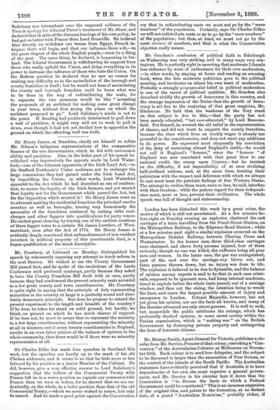Mr. Goschen's confession of political faith in Edinburgh on Wednesday
was very striking, and in many ways very con- tagious. He is perfectly right in asserting that moderate Liberals lose influence by want of enthusiasm for their own moderation,. —in other words, by staying at home and reading an amusing book, when the less moderate politician goes to the political meeting, and inculcates on others his own want of moderation. Probably a strongly propagandist belief in political moderation is one of the rarest of political qualities. Mr. Goschen also described vividly the growth of democracy in this country, and the strange impression of the Tories that the growth of demo- cracy is all due to the conjuring of that great magician, Mr.. Gladstone. He held that the weakness of the Tory creed on this subject is due to this,—that the party has not been merely educated, "but over-educated," by Lord Beacons- field. For himself, he avowed the old belief in the representation of classes, and did not want to support the county franchise,. because the class which lives on weekly wages is already too powerful in the constituencies, and does not want any additions to its power. He expressed moat eloquently his conviction of the duty of sustaining abroad England's credit,—he would not call it England's "honour," since the " honour " of England was now associated with that great blow to our national credit, the swoop upon Cyprus,—but he insisted on the difficulty, if not impossibility, of at once civilising half-civilised nations, and, at the same time, treating their patriotism with the respect and deference with which we always do and must treat the patriotic feelings of free Western States.. The attempt to civilise them must, more or less, he said, interfere- with their freedom ; while the jealous regard for their independ- ence must, more or less, prevent their civilisation. The whole speech was full of thought and statesmanship.






































 Previous page
Previous page